Georgia arrests revive assisted-suicide debate
ATLANTA â The man told Thomas Goodwin he wanted to kill himself to end the pain of pancreatic cancer. But first he wanted to go downstairs to get a photograph of his wife.
So Goodwin -- president of Final Exit Network, one of the nationâs most prominent assisted-suicide groups -- waited in the bedroom for the man to return.
Instead, Goodwin was surprised by agents from the Georgia Bureau of Investigation, who burst in and arrested him Wednesday. They also opened a new front in a resurgent war over assisted suicide.
While other right-to-die activists nationwide have been fighting for -- and in some key cases recently, winning -- the legal right to assisted suicide, volunteers from Goodwinâs 5-year-old nonprofit organization have focused on quietly visiting the bedsides of sick Americans and offering suicide instructions, which they prefer to call âguidance to self-deliverance.â
Using a system that incorporates helium tanks available at many party supply stores and a plastic hood, the group has helped about 200 people in pain end their lives peacefully, according to Derek Humphry, chairman of the groupâs advisory board.
The Georgia sting, in which an agent posed as a cancer victim, comes a decade after the homicide conviction of Jack Kevorkian, the Michigan doctor and well-known assisted-suicide advocate who administered a lethal injection to a man suffering from Lou Gehrigâs disease in 1998. Kevorkianâs eight-year prison stint lowered the national profile of what had been a white-hot ethical and legal debate.
But the issue has begun heating up again. In November, voters in Washington made their state the second, after Oregon, to legalize physician-assisted suicides. A month later, a judge in Montana legalized the practice as well; the state is appealing the decision. A legalization bill was introduced in the Hawaii Legislature this year, but it will not get a hearing. Similar bills are pending in New Hampshire, Massachusetts and New Mexico.
In many places, however, assisting a suicide remains a criminal act; in Georgia, it is a felony punishable by up to five years in prison. Opponents of assisted suicide are hailing the arrest of Goodwin, along with three other members of the group who were also charged, as a much-needed victory for the status quo.
Assisted-suicide foe Rita Marker said she expects Americans will find the details of the groupâs methods âgrotesque.â
âThereâs no dignity in getting a plastic bag over your head,â said Marker, executive director of the International Task Force on Euthanasia and Assisted Suicide, an Ohio nonprofit group.
But some proponents also welcome the arrests, saying they hope the ensuing legal fight will help tear down remaining anti-suicide statutes.
âWe will fight this all the way to the Supreme Court,â said Humphry, the author of âFinal Exit,â a bestselling suicide manual from which the group took its name. âThis could be the seminal case on which the law turns. And we take encouragement from the fact that three states have already got it. So why shouldnât the rest of America have it?â
John Bankhead, a GBI spokesman, said the sting operation helped investigators verify the methods used by the Final Exit group. Technically, however, the criminal charges stem from the June 19, 2008, suicide of John Celmer, a 58-year-old cancer patient from Cumming.
According to an affidavit filed by investigators, Celmer was âcancer free at the time of his death,â although he was embarrassed about his appearance after surgeries for head and neck cancer. He also suffered from arthritis.
The Final Exit website, www.finalexitnetwork.org, clearly outlines the criteria for those who want help from the groupâs volunteers. One is: âYou must have an incurable condition which causes intolerable suffering.â
The affidavit outlines the detailed process the group uses to determine whether someone is eligible for house calls from the groupâs âexit guides.â It also outlines the groupâs alleged involvement in Celmerâs death.
Celmer apparently wrote to the group in May, saying he wanted to die using the helium method. In the letter, he said he would âpatheticallyâ take âmeasures into my own handsâ if they didnât come to his aid. In compliance with one of the groupâs rules, he also wrote a summary of his medical history and included some medical records, which investigators said were forwarded to Lawrence Egbert, 81, a Baltimore doctor and the groupâs medical director.
After Celmerâs death, his wife found one of the letters as well as release forms he had signed for the group. Celmerâs family called authorities, and in a subsequent taped phone call with Celmerâs son, Final Exit member Claire Blehr, 76, of Atlanta, said that she and Goodwin, the president of the Atlanta-area group, had been with Celmer when he died.
In another call, Goodwin explained the helium method in detail and said he had thrown the tanks and plastic hood into a Dumpster in Acworth, Ga.
Blehr and Goodwin also stated that they held Celmerâs hands during the 12-minute helium inhalation process, according to the affidavit.
âThis would have prevented John Celmer the ability to pull the hood off his head if he changed his mind about dying,â the document states.
Blehr was arrested Wednesday in Georgia and remains in custody. Egbert, a visiting assistant professor at the Johns Hopkins School of Medicine, was arrested and jailed in Baltimore.
A fourth alleged member of the group, Nicolas Alec Sheridan, 60, of Baltimore, was also charged but is not in custody.
All four are charged with assisted suicide, tampering with evidence, and violation of Georgiaâs racketeering and corrupt influences act. If convicted on all counts, each faces 18 years or more in prison.
Humphry said Final Exit has about 100 volunteers around the country who have been trained by Egbert to serve as guides during the death process. Bankhead of the GBI said its investigation has spread to eight other states -- Florida, Maryland, Michigan, Ohio, Missouri, Colorado, Arizona and Montana -- to determine if some of those volunteers are linked to other Georgia suicides.
In Arizona, Maricopa County Atty. Andrew Thomas said Thursday that local officials were examining whether two Final Exit members assisted in the suicide of a 58-year-old woman who was not terminally ill, according to the Associated Press.
Humphry, who briefly worked as a Los Angeles Times reporter in the late 1970s, said the âexit guidesâ were trained to know when they were crossing the legal line in each state. He said they do not buy or touch the materials needed for the job, nor do they switch any buttons on.
âItâs not a crime in America to be in the presence of a suicide,â he said.
--
More to Read
Sign up for Essential California
The most important California stories and recommendations in your inbox every morning.
You may occasionally receive promotional content from the Los Angeles Times.










